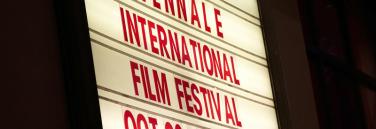
The Viennale is a curated festival that brings together and selects films from the previous year’s body of auteur cinema, combining well-known film-makers and much-awaited films with marginal cinematography and undiscovered authors. The Viennale is also, by tradition, a festival for the audience, whose trust has been gained through a commitment to daring proposals and a vision of continuity that sustains its programming. The selected films reflect on and discuss the formal elements of film language and celebrate cinema as cultural and authorial expression. The Viennale is also a film lover’s festival, and that is why it combines the new and the old, so that retrospectives and thematic focuses accompany the contemporary programme.
We are honoured by this invitation from Tabakalera, a film research centre with which we feel a great affinity. In response, we have organised programmes that work their way through the different sections of the Viennale.
In the first programme we present a selection of short films. Short films have an important position in the Viennale, because we try to promote unconventional expressions, both in form and format, by new authors and also by highly-regarded film-makers. The programme – with different tones, themes and geographies – aims to evoke political consciousness and historical reflection.
The second programme celebrates the history of cinema through a character whose professional career is closely linked to the most important auteur cinema of the last five decades. The actor and director Jean-François Stévenin has worked on more than a hundred films with masters such as Rivette, Cavalier, Truffaut, Demy, Godard, Breillat, Téchiné, Ruiz, etc.
Passe-montagne (1978) was his first feature film as a director and the film has recently been restored and prepared for circulation.
In the third programme we present one of the outstanding films of last year, the work of a film-maker who is interested in margins and limits. Independent and tenacious in his production, Roberto Minervini embodies the vigorous resistance of art cinema and the work ethic of the director.
It is a film whose political and social discourse is consistent with the complexity of contemporary society.
Finally, the fourth “carte blanche” introduces one of the thematic focuses of the last festival. The two films, which have been rescued by the Vienna Film Archive, celebrate the vivacity of a world – the Jewish community in the 1920s – which was paralysed by the historical events of the last century. With the aim of uniting the historical memory of the cinema with the contemporary, these films are presented accompanied by the original music performed live by the Inou Ki Endo electronic music project.
The Viennale is a curated festival that brings together and selects films from the previous year’s body of auteur cinema, combining well-known film-makers and m
